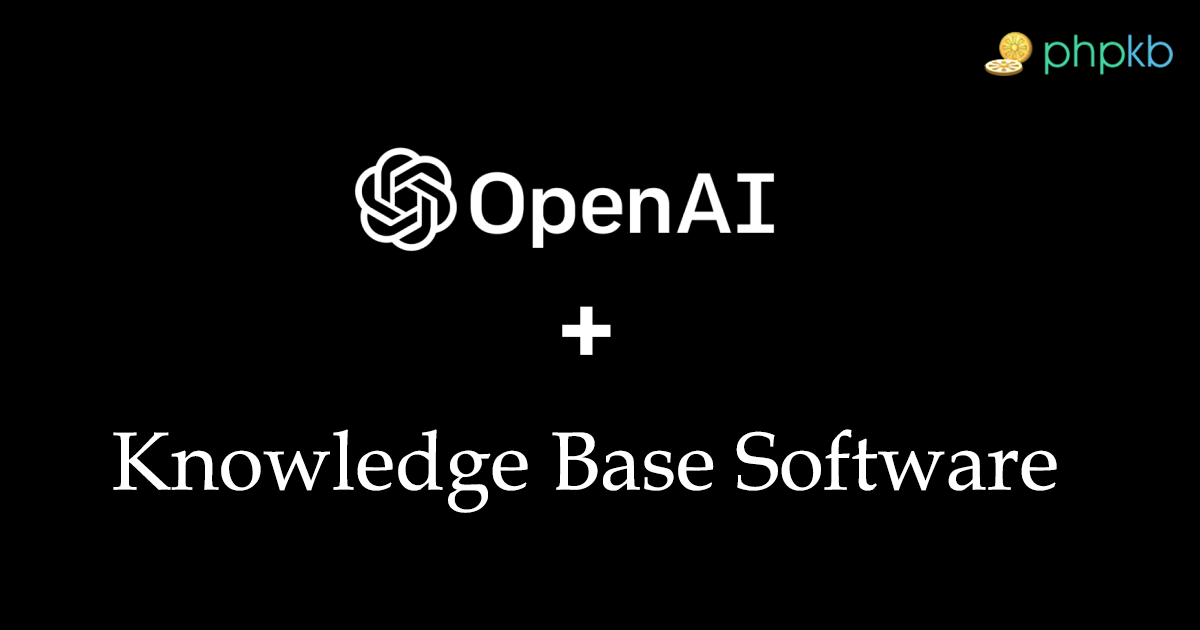Maximizing the Benefits of OpenAI Integration in PHPKB Knowledge Base Software
Estimated Reading Time: 3 MinutesOpenAI is a cutting-edge artificial intelligence and machine learning technology that can be integrated into a knowledge base software to provide several benefits to knowledge managers. With its advanced natural language processing (NLP) and information retrieval capabilities, OpenAI can help knowledge managers to create, manage, and distribute information more efficiently and effectively.

By integrating OpenAI into a knowledge base software, knowledge managers can improve the accuracy and relevance of the information in their knowledge base, provide a better user experience for those accessing information, and maximize the benefits of their knowledge management efforts. In this article, we will explore the key benefits of OpenAI integration in knowledge base software and how it can help knowledge managers to achieve their goals.
OpenAI Integration with Knowledge Base Software
OpenAI (GPT) can be integrated into PHPKB knowledge base software to provide a number of benefits to knowledge managers. Here are a few ways OpenAI can help:
Content Creation: OpenAI's natural language processing (NLP) capabilities can be used to automatically generate articles and content for the knowledge base. By using OpenAI, knowledge managers can save time and effort in creating new content, as OpenAI can generate articles in a matter of seconds. In addition, OpenAI's NLP capabilities can also be used to categorize and tag articles, making it easier for users to find the information they need.
Information Retrieval: OpenAI's information retrieval capabilities can be used to enhance the search functionality of the knowledge base. For example, OpenAI can use text classification and information extraction techniques to automatically categorize and tag articles, making it easier for users to find what they're looking for. In addition, OpenAI can also provide recommendations for articles and content that are related to a user's search query, making it easier for users to find the information they need.
Content Optimization: OpenAI can be used to analyze the performance of articles and content in the knowledge base, and provide recommendations for optimization. For example, OpenAI can analyze the search queries that are being used by users, and make recommendations for improving the accuracy and relevance of the information in the knowledge base. By using OpenAI to optimize the content in the knowledge base, knowledge managers can ensure that users are able to find the information they need, and that the information is up-to-date and accurate.
Virtual Assistant: OpenAI can be integrated into PHPKB knowledge base software to provide a virtual assistant that can answer questions and provide information to users. This virtual assistant can provide 24/7 access to information, and can help to reduce the workload on knowledge managers by answering common questions and providing information to users.
Personalization: OpenAI can be used to personalize the information that is delivered to users based on their specific needs and context. For example, the information that is shown to a user may be different based on their location, device, or previous interactions. By personalizing the information that is delivered to users, OpenAI can improve the user experience and ensure that users are getting the information that is most relevant to them.
Conclusion
By integrating OpenAI into PHPKB knowledge base software, knowledge managers can take advantage of the powerful AI and NLP capabilities of OpenAI to improve the efficiency and effectiveness of their knowledge management efforts and provide a better user experience for those accessing information. Whether it's generating new content, improving information retrieval, optimizing content, providing a virtual assistant, or personalizing information delivery, OpenAI can help knowledge managers to maximize the benefits of their knowledge management efforts.